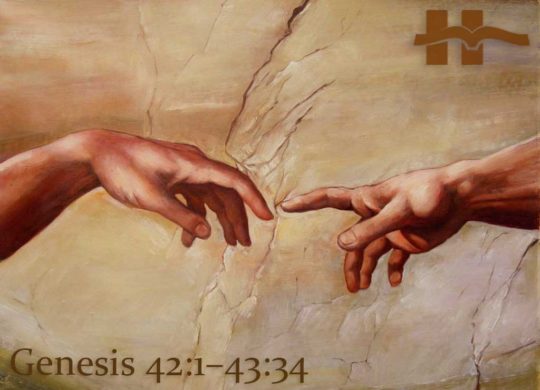Genesis 42:1–43:34

God’s discipline and their selflessness and submission to God, lead agents of divine blessings to resolve past sin.
This section begins with the famine of 41:57 being assumed as the background. So the brothers (without Benjamin, Jacob’s favorite) are dispatched to Egypt for food.
When the brothers arrive in Egypt, one cannot but wonder how their path intersected with that of Joseph. That a tiny group of people, among the many hungry foreigners and natives in Egypt looking for food, just happened to meet the Prime Minister of the land would be an astounding coincidence, were it not for our knowledge of the sovereignty and providence of God, who has been, and continues to be, at work all through the Joseph Story.
But the long-lost sibling does not reveal himself to his brothers whom he recognizes: Joseph does not trust his brothers. Instead, he tests them (42:15, 16) to see whether their attitudes of the past had changed or not. The accusations and defenses—that the sons of Jacob are “spies” and not “honest men” (42:9–14)—are traded back and forth, bringing home powerfully to the brothers the impact of a false accusation. It must have gotten them thinking about what they had done to an innocent brother, Joseph. In any case, the brothers are permitted to return home, sans Simeon (42:19), who would be held hostage until Benjamin was brought to Egypt.
This complication produces a lot of self-examination amongst the brothers who proceed to confess among themselves, truly remorseful of what they had done to their Joseph many years ago. In fact, they connect present “distress” with the “distress” they had themselves inflicted on another innocent (42:21–22)—this is clearly a changed group of characters.
On their journey back home, the brothers discover money in the sack of one of them (42:27–28; also in 42:35), and the siblings are thrown into even more consternation. Again they see the hand of God operating against them in judgment for past misdeeds.
So we see here role-reversal—the brothers get a taste of Joseph’s own suffering in precise sequence: helplessness with bullying, false charges with serious repercussions, and imprisonment. But we also see role-duplication—with the money in their bags, they are being tested to see if they will now make the same egregious choice as they did before, to abandon a brother.
At any rate, once home, Judah successfully persuades Jacob to send Benjamin with them on the second journey to Egypt (43:3–10). This brother’s reference to Benjamin as “our brother” (43:4) counters Jacob’s label (“my son”) and the exclusivity (“he alone is left”) with which he talks of Benjamin (42:38). Yet there is no resentment exhibited with regard to the aspersions cast on him, Judah, and his brothers by Jacob, that they had done away with two of his sons (42:36). Clearly, Judah (with his siblings) has been transformed: his selflessness here for the sake of the larger family unit/tribe is remarkable.
In Egypt, in a poignant scene, Joseph is deeply stirred as he sees Benjamin, “his brother” and “his mother’s son” (43:29–30). But Joseph will exercise this favoritism towards his closest sibling again, seeing that he gets five times as much food as the others (43:34). Would the brothers fret and fume over one more exhibition of favoritism? If they did, then the subsequent arrest of Benjamin over the putative theft of Joseph’s silver goblet would turn out to be a godsend to those stewing in spite. In other words, the brothers are being strongly tempted to treat the special kid, Benjamin, as they had treated another special son, Joseph. But we get ahead of ourselves—that’s in the next section.











 Abe Kuruvilla is the Carl E. Bates Professor of Christian Preaching at The Southern Baptist Theological Seminary (Louisville, KY), and a dermatologist in private practice. His passion is to explore, explain, and exemplify preaching.
Abe Kuruvilla is the Carl E. Bates Professor of Christian Preaching at The Southern Baptist Theological Seminary (Louisville, KY), and a dermatologist in private practice. His passion is to explore, explain, and exemplify preaching.